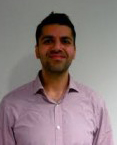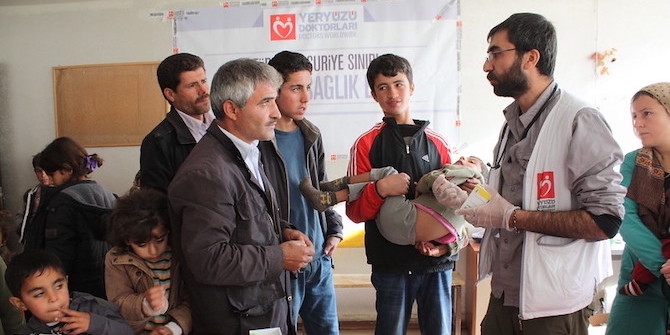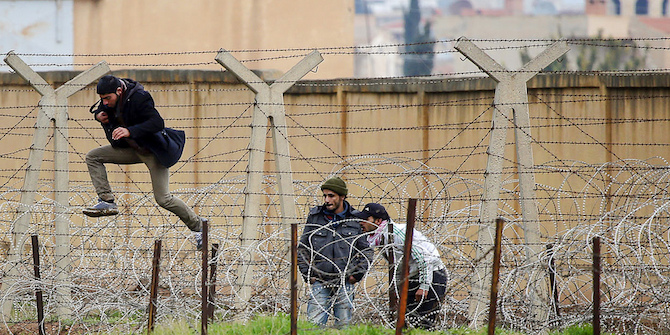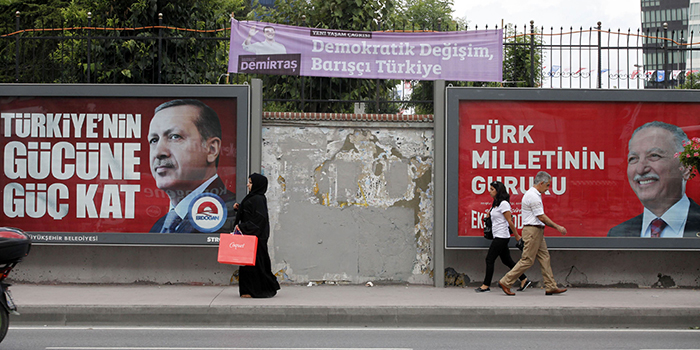by Arash Heydarian Pashakhanlou

In one of his most memorable advices to the prince, the Italian Renaissance thinker, Niccolò Machiavelli, remarked that it is better to be feared than loved, if one cannot be both. However, he urged the prince to avoid being despised and hated. In the aftermath of the coup attempt of July 16, the Turkish President Recep Tayyip Erdoğan attempts to balance these three central emotions.
After the coup, Erdoğan called the public to take to the streets in Istanbul to show their support for the government. Through this manifestation Erdoğan attempts to demonstrate that it is him that the public supports. Facebook groups and Twitter accounts like ‘We Love Erdogan’ also seeks to highlight the people’s love for the President.
In reality, it is mainly the religiously conservative and those who have benefitted economically that support him. In their view, Erdoğan is responsible for the economic success of the country, Islam’s greater role in society and Turkey’s boosted regional standing in the Middle East.
If Erdoğan is to retain the love of his supporters, he must therefore continue to promote their economic and religious interests. Otherwise, their love for him may start to falter. Erdoğan has however taken precautionary steps to make his supporters more dependent on him, making it more difficult for them to abandon him. Indeed, he has designed a system in which loyalty to him – rather than merit – is the primary determinant of one’s fortune. Their fate is subsequently tied with that of the President. If Erdoğan loses, they lose and vice versa. This way, Erdoğan can ensure their support even when their love for him is gone.
In line with Machiavelli’s prescription, Erdoğan has however mainly relied on fear rather than love. This emotion provides a more secure basis for power since men love according to their own will and fear according to that of the leader. Consequently, over 60,000 soldiers, policemen, judges and other ‘dissidents’ have been suspended or arrested in the aftermath of the coup attempt thus far.
Amnesty International claims that credible evidence suggests that detainees in Turkey have been subjected to beatings and torture, even rape. Erdoğan has also declared his willingness to reinstate the death penalty for the thousands of alleged coup plotters. As Machiavelli writes: ‘fear preserves you by a dread of punishment which never fails’.
The declared state of emergency which allows Erdoğan to sign laws without prior parliamentary approval, along with his extension of the maximum period of detention for suspects from four to 30 days, enable him to combat his foes more effectively and tighten his grip on the country.
This, however, is a delicate balancing act. Excessive cruelty may result in hatred rather than fear. Unlike fear, which intimidates people from rising up, hatred promotes revolts against the ruler. As Erdoğan keeps on cracking down on targets, his actions may turn out to become counter-productive, if they are deemed unacceptable by the general population.
Erdoğan has also seized all properties of the thousands of schools, universities and private institutions. According to a statement by the University Women’s Collective in Turkey, Erdoğan’s regime sexually harasses women, and the wives and daughters of defectors have been threatened by rape. If true, Erdoğan is playing with fire here according to Machiavelli. Indeed, the Italian philosopher contends that being rapacious and violator of the property and women of one’s subjects are the main sources of hatred.
Moreover, although Machiavelli recommends avoiding hatred from all sources, he especially warns the prince of being hated by the most powerful. In this regard, he maintains that the hatred of the army is particularly alarming, since it has the capacity to dethrone the leader with violent means. This is where Erdoğan faces his biggest challenge.
His Achilles heel is hatred. His ability to deal with this emotion will seal his fate and that of Turkey.
The coup revealed that at least parts of the military is discontent with his rule. In order to deal with this threat, Erdoğan has dishonourably discharged nearly 1,700 military personnel and approximately 40 percent of Turkey’s admirals and generals. Time will tell if these measures will prove to be sufficient.
In general, Machiavelli contends that the ideal prince should be like ‘a most valiant lion and a most cunning fox’ and will then be ‘feared and respected by everyone, and not hated by the army’. Erdoğan has thus far managed to handle love and fear successfully. His Achilles heel is hatred. His ability to deal with this emotion will seal his fate and that of Turkey.
 Arash Heydarian Pashakhanlou is a Lecturer in Politics & International Relations at Sheffield Hallam University. He is the author of ‘Back to the Drawing Board’ and ‘Waltz, Mearsheimer and the Post-Cold War World’ which appeared in the journals of International Relations and International Politics respectively. He tweets at @arash_hp.
Arash Heydarian Pashakhanlou is a Lecturer in Politics & International Relations at Sheffield Hallam University. He is the author of ‘Back to the Drawing Board’ and ‘Waltz, Mearsheimer and the Post-Cold War World’ which appeared in the journals of International Relations and International Politics respectively. He tweets at @arash_hp.







Erdogan as a 21st-century Machiavellian Prince is an interesting idea, except, of course, for the [skewed] electoral process through which Sultan Erdogan is staying in power. Erdogan’s seeming success [until the next military coup , which in Turkey’s case will be GOOD for democracy in some Muslim societies ] in turning non-Arab Turkey into an Islamist state after NINETY years of official Kemalist secularism and the thuggish manner in which Ankara is trying to become an EU member using Syrian refugees as Erdoganite blackmailing pawns is reminiscent of…. 1648 and – most importantly- proves that Islam and democracy are as compatible as Islam and pork. At this point , the one ray of hope for eventual separation between religion [Din] and state [Dawla] in the Middle East is in Egypt under President al-Sisi. Any fair comparison between al-Sisi’s memorable speech at Al-Azhar in 2014 and B.H. Obama’s at the American University in Cairo in 2009 indicates which leader is influenced by the Muslim Brotherhood, and why Erdogan has been the poster- boy of “enlightened Islam” in Washington since 2009. As for the refugee crisis it is the 57-nation strong OIC [Organization of Islamic Cooperation] not only Turkey, Lebanon and Jordan and not Europe, Canada etc., , which should be shouldering the humanitarian burden.